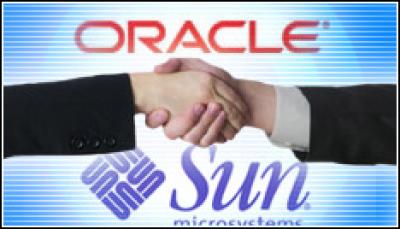EC To Review Oracle-Sun Deal

The Brussels-based European Commission has scheduled an antitrust review date of 3 Sept to discuss the multinational companies’ proposed deal
In the wake of the 20 Aug news that the U.S. Department of Justice has cleared the government path for Oracle’s acquisition of Sun Microsystems to be completed later this fall, analysts are weighing in on whether the $7.4 billion (£4.5bn) transaction will weather a challenge from another prominent regulatory agency: The European Commission.
The Brussels-based EC said on 3 Aug that it has scheduled an antitrust review date of Sept. 3 to discuss the multinational companies’ proposed deal. It will look closely at two main areas of concern: Sun’s Java networking software franchise and the enterprise parallel database market — two sectors in which Oracle stands to greatly increase its market share.
Oracle, along with its acquisitions of PeopleSoft and Siebel, already owns nearly half of the enterprise parallel database market. IBM, with its DB2, comes in at around 22 percent. Microsoft SQL Server has about 19 percent, with Sybase, Teradata, Ingres and Sun’s open-source MySQL taking up most of the final 9 percent.
Oracle would control more than half the market following the Sun acquisition, most analysts agree.
If the Oracle-Sun transaction is not approved by the EC at the Sept. 3 meeting or shortly thereafter, it said it may decide to initiate a full due-diligence probe. Such an investigation could take as long as four months, putting a serious slowdown in the acquisition plans. Oracle founder and CEO Larry Ellison has made it clear he wants to complete the acquisition as soon as possible.
George Weiss, vice-president and distinguished analyst at Gartner, told eWEEK that he thinks the EC may require several weeks to come to a decision after the 3 Sept meeting.
“Is this [the addition of Sun’s MySQL to the Oracle product line] a looming threat to the MySQL community as a result of an apparent conflict with Oracle’s mainstream commercial DBMS business? I doubt EC could make that an issue, especially with Oracle’s firm commitment to Linux, and other open-source-related acquisitions,” Weiss said.
“Moreover, Oracle can show that MySQL will be an enhancement to the market in which Oracle can provide the same performance tuning, management and scaling that it has applied to Oracle DBMS (with some limitations, of course).”
This would give Oracle two market opportunities to deliver DBMS systems: that part of the market interested in a subscription and open development model on commodity HW and to a large, robust and enterprise DBMS market which cares for lots of “bells and whistles” at minimal risk, Weiss said.
“It would be very difficult for Oracle to squelch MySQL, since the community is extremely large and many expert developers could spawn a fork and leave the Oracle-based product behind,” Weiss said.
Weiss’s UK-based Gartner colleague, Andrew Butler, told eWEEK that he believes the EC will indeed sanction the merger, “although there is evidence of some pressure on the EU coming from one or two major vendors.”
“As with the U.S. regulatory authorities, the EU will be concerned over the Oracle intentions regarding Java and the positioning of MySQL, but it is unlikely that they would seek to block the deal,” Butler said.
Will Oracle — which has in the past been notoriously proprietary — be a friend to the open-source community?
“We should put ‘friend’ in quotes until we can define the term in Oracle’s context,” Weiss said. “So where open source benefits Oracle’s overall market and financial goals, then we will likely see friendly overtures.”
Butler said there are precedents for Oracle to own open-source software.
“For sure, many components of Sun’s middleware stack overlap heavily with Oracle’s Fusion strategy and some products will logically die or become absorbed,” Butler said.
“Oracle will leverage the likes of GlassFish (both Application Server and ESB), Mural (open source MDM) and MySQL to counter the threats of JBoss, IBM’s WebSphere CE, Progress Fuse and other OSS ‘stacks.’ They will then present existing Sun users with an effective ‘on ramp’ to the Fusion suite.”
How might Java and its sprawling open-source community fare under the stewardship of Oracle?
“Tampering with Java processes, community development, and APIs in such a way as to create Oracle-only versions with specific changes in the spec could alienate large parts of the community, including vendors like IBM who have a large stake in it,” Weiss said. “That would only create fragmentation and diminish its value, contrary to Sun’s strategy. I’m sure Java strategy and disposition were an integral part of Oracle-Sun discussions for the deal to pass.”
Butler said that by buying Sun, “Oracle will acquire the Java trademark and licensing, plus governance of the Java Community Process (JCP). This will give Oracle an entry into the consumer/mobile devices via embedded Java.
“Without doubt, Oracle will ‘monetize’ Java much more effectively than Sun ever did. But we do not know they will ‘hijack’ Java and try to turn it into a proprietary, Oracle-only technology. They will recognise that Java must remain an open standard to remain a credible alternative to Microsoft. The challenge for Oracle will be to maintain loyalty and support from crucial Java supporters like IBM, SAP, Nokia and other major industry players (including open-source communities),” Butler said.